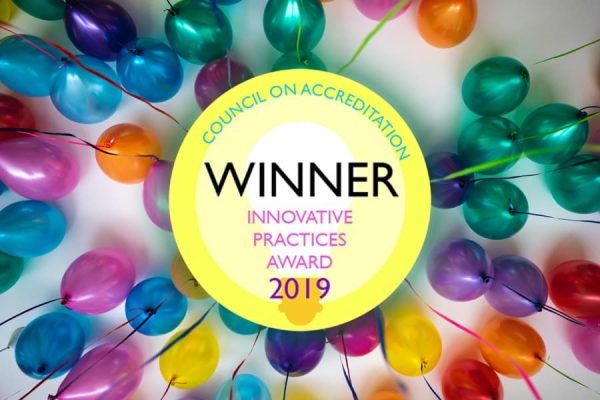The Council on Accreditation’s 2019 Innovative Practices Award celebrates LCFS’ Regenerations program as an example of successful innovation in the human services field.
Sadly, Illinois has struggled with hundreds of older foster youth in correctional and detention centers that are past their release dates, but stay in jail because they have no place to go. Many times these youth were being referred to residential treatment facilities, which often wasn’t the appropriate service, but became the default because an identified program for dually-involved youth didn’t exist.
So, Lutheran Child and Family Services of Illinois (LCFS) created its Regenerations program to get youth out of jail and with a caring family, while providing support and services to help along the way.
“Almost fifteen years ago, LCFS realized that there were youth that needed a second chance,” explains Mike Bertrand, LCFS President/CEO and co-founder of the Regenerations program. “These were youth that everybody else had given up on. Our calling would not allow us to give up on them. Our value of being an innovative organization led us to create our Regenerations program to serve these youth and has shown incredible results.”
The Regenerations program was designed to get youth released from correctional and detention centers faster and into a family-like setting, rather than a residential facility. This reduces the cost of care, but also reduces the trauma imposed on the youth, while increasing their sense of well-being. In addition, the Regenerations program looks to avoid recidivism, while keeping youth safe and helping them to reach their potential.
LCFS staff meet with the youth referred to the program prior to release to begin to build a trusting relationship, identify supports, discover individual skills and aspirations, and engage in identifying possible caregivers. If the child is unable to identify with whom to live, they are placed with a licensed LCFS foster family.
Once the youth is living in a safe environment, they are enrolled in school or vocational training. Regenerations staff arranges for intensive wraparound services (for all involved) in order to transition the youth into the community and give them the opportunity to lead healthy, meaningful lives. Throughout this process, there are barriers that can occur and must be addressed.
“It doesn’t do any good to convince a youth to enroll in school when he or she is terrified because they have to cross rival gang territory to get there,” explains Bertrand. “So in cases such as these, LCFS staff depend on using information gathered from the youth’s advocate, Child and Family Team meetings, etc. and devise a way to keep the youth safe. This may include something as drastic as assisting the family to move out of the neighborhood.”
Nearly 300 youth have been served by LCFS’ innovative Regenerations program, and the results have been promising. Regenerations is one of the only programs designed to successfully serve this group, and its success is recognized by receiving the Council on Accreditation’s (COA) 2019 Innovative Practices Award.
ABOUT THE COA INNOVATIVE PRACTICES AWARD
The Council on Accreditation’s (COA) Innovative Practices Award identifies, documents, and celebrates examples of successful approaches to management and service delivery practices adopted by COA-accredited organizations. Too often great ideas are kept in-house without recognizing their potential to create change beyond. The purpose of the Innovative Practices Award is to amplify the effect of one great idea by elevating it to the national stage, offering it as a resource for direct service providers, leadership, researchers, and advocates across the full spectrum of human services.
This year’s evaluation process began with a preliminary round of submissions in which applicants provided a one-page synopsis of their innovative practice. 75 programs were submitted; six were selected to move forward. Five of these submitted their full case studies, which were reviewed by a team of expert judges. The community got to weigh in, as well, with over 1,000 public votes making up 5% of each submission’s final score. It was a tight competition with many strong submissions, but Regenerations
came out on top. You can download the case study of the Regenerations program here: https://
sforce.co/2VjBGeE






